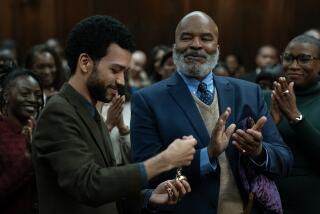With ‘Dear White People,’ Justin Simien wants to start conversations

Coming on like a fresh breeze amid the hot air that so often accompanies talk about race, “Dear White People” is both a conversation piece and a calling card, announcing writer-director Justin Simien, in his feature debut, as an invigorating voice, someone original from a new generation.
From the recent events in Ferguson, Mo., to the media dust-up over an essay on television in the New York Times, the broad subject represents a minefield no matter the arena. The playfully incendiary satire of “Dear White People,” set amid a racially charged college campus, takes it on, head-on, while diffusing tension with wit and humor.
Opening Oct. 17 in limited release from distributor Roadside Attractions before a national rollout later this month, the film won prizes at the Sundance and San Francisco film festivals and was selected for the prestigious New Directors/New Films program in New York City. A companion book of essays written by Simien, with the lighthearted subtitle “A Guide to Inter-Racial Harmony in ‘Post-Racial’ America,” will also be published this month.
The story is set at the fictional Ivy League-ish school Winchester University — Calum Marsh in the Village Voice called it “a satire about racism among those least inclined to regard themselves as racist.” Samantha White (Tessa Thompson) is a campus provocateur who runs a college radio show called “Dear White People” in which she cheekily addresses how white and black students interact. For example, the number of black friends required of a white student to not seem racist has been raised to two. (Weed dealers don’t count.)
When Sam is unexpectedly elected to lead the traditionally black residence hall on campus, it sets a match to an already volatile situation. Everyone brings their own agenda, including the dean (Dennis Haysbert) plus his politically ambitious son, Troy Fairbanks (Brandon P. Bell), along with an array of students: Coco Conners (Teyonah Parris), trying to leverage the controversy into a career in reality TV, and an aspiring journalist, Lionel Higgens (Tyler James Williams), grappling with identity issues of his own.
Simien said he sees pieces of himself in all the characters — with Lionel coming to terms with being black and gay perhaps the most overt parallel — as each character is shown navigating between the persona they present to the world and who they may be in private. In this way the film explores definitions of “blackness” by boiling them down to issues of personal identity while also challenging mainstream media tendencies to assume there is a standard black experience.
“We all struggle with who we are versus who we appear to be,” Simien, 31, said in Los Angeles. “So it was an attempt to articulate that very awkward process of moving culturally between spheres and knowing my experience is a singular one not everyone else is having around me.
“And that’s part of my black experience, needing to articulate that experience but it not always feeling safe to do so. When Sam says certain things in the film, it is labeled as reverse racism and does cause some controversy. But some of those things need to be said, there’s no other way to say it — ‘Stop touching my hair. It’s inappropriate.’”
Alongside a media savvy backstory in getting the film off the ground and out to the world, part of what has also set “Dear White People” apart is the distinctive diversity of influences behind it. Although Simien has been sure to acknowledge leading African American predecessors such as Spike Lee or John Singleton — he introduced an academy screening of Lee’s debut, “She’s Gotta Have It,” in Los Angeles over the summer — he has also made references to filmmakers Wes Anderson, Stanley Kubrick, Ingmar Bergman, Fritz Lang and a host of others. In talking about her character, Thompson has referred to the unlikely trio of Angela Davis, Aubrey Plaza and Bea Arthur.
“I think the difference in our generation, the sort of African American millennial, is we were not only influenced by black culture, we just weren’t,” said producer Lena Waithe, also a screenwriter writing on the series “Bones” and working on a pilot for BET. “I’m obsessed by Spike Lee, but I’m also obsessed with Spike Jonze. And that’s something Justin is trying to address, that there is no one way to be black. You can’t define that for us because we are constantly redefining it for ourselves.”
With sharp-eyed wit and sense of being an equal-opportunity offender, the film picks over signifiers of dress and speech, explaining how one tips in a restaurant as a projection of personality and putting forward an uproarious race-based reading of the movie “Gremlins.” This electric charge and sense of daring were apparent right from Simien’s script.
“I’d never seen a project like it,” said Thompson, who will also be seen this year as civil rights activist Diane Nash in Ava DuVernay’s “Selma.” She added that before being cast she wrote a letter to Simien saying that whether she ended up in the film or not, his was a new voice she was excited to follow. “I didn’t know what kind of life it would have,” she added, “but I knew I hadn’t read anything like it.”
Born and raised in Houston, where he attended the High School for the Performing and Visual Arts, Simien went on to Chapman University in Orange County to study film. After graduation, he moved to Los Angeles to work in studio jobs, as a publicity assistant at Focus Features, publicity coordinator at Paramount Pictures, social media manager at Sony Television and interactive producer at Participant Media. At the same time, he was working on a number of scripts, including a sprawling, Altman-esque multi-protagonist look at life on a college campus.
As he began to whittle that into what would become “Dear White People,” he started a Twitter account to work out the pithy, provocative voice of the character Sam White. In 2012, he used a tax refund to make a concept trailer that gave a sense of the look and tone of what the film would be, anchoring a crowdfunding campaign. Within days of posting that online he was on CNN talking about the project as a social media success.
Made with a budget that Simien simply allows as “real low,” the film went into production in Minnesota in summer 2013, with Simien and his team racing to finish in time for a Sundance premiere in January. “We had this following before we ever made the movie, but I can’t say that was my master plan,” Simien said. “I just knew to do these things because that was the world that I came from.”
Having now introduced himself to the world as a filmmaker, Simien is weighing his options of what to do next, with an interest in possibly turning the characters from “Dear White People” into a television series.
Perhaps the very definition of a conversation-starter, “Dear White People” is a film that gets viewers excited to talk. With a disarming air of charm — not unlike Simien himself — the film somehow makes the hard conversations a bit easier to get into.
“I know that people are going to talk about the issues in the film,” said Simien, further referring to race, sexuality and gender, “but ultimately I want people to walk away thinking about their own identities and the way in which they created the character that they play and the way that character holds them back and pushes them forward. Truly, that’s what the movie is about to me.
“That to me was the whole point, for people to see themselves,” he added, “maybe be a little uncomfortable with what they see and go out into the world maybe rethinking themselves.”
Twitter: @IndieFocus
More to Read
Only good movies
Get the Indie Focus newsletter, Mark Olsen's weekly guide to the world of cinema.
You may occasionally receive promotional content from the Los Angeles Times.







